Will Tidal's artist exclusives ruin streaming music?

Tidal, the Jay Z-led music-streaming service, recently relaunched at the end of March with a roster of high-profile celebrity backers, like Madonna, Rihanna and Kanye West. The event was much more than an obvious photo-opp; it was a statement: In addition to a ceremonial pact signing, the group of over a dozen artists pledged to tackle fair compensation and improve the current state of streaming affairs for consumers and musicians. Part of this strategy involves offering content exclusive to Tidal. And while extra content is nice, it becomes worrisome when the exclusive bits take the form of much-anticipated full album releases. That seems to be Tidal's plan to lure and retain subscribers. It's a business plan that could very well kill the streaming-music vibe for everyone, especially when we've become used to an all-you-can-stream listening habit.

Madonna had to get comfy before signing the pact.
Look, I get it. The best way for these services to attract new users is to promote what makes them different. When your business is providing content, you need stuff that no one else has, and that's what Tidal has been trying to do since its launch. Earlier this month, Beyoncé's new song, an anniversary present to Jay Z (real name: Shawn Carter), debuted exclusively on that service. And that behavior's nothing new for streaming-music services. In fact, Spotify regularly releases its Spotify Sessions live recordings with artists like Meghan Trainor, Ryan Adams and many other artists. It also serves up Spotify Commentary versions of albums, in addition to timed releases. And Rdio does something similar with live EPs, and bonus tracks. I'm all for added content that complements the regular albums, but when the differentiation becomes exclusive artist rosters rather than the so-called bonus content, the cost for consumers looking for choice begins to add up. It's either sign up for multiple streaming services or find another way to listen (hello, piracy).
Are the artists really in control?
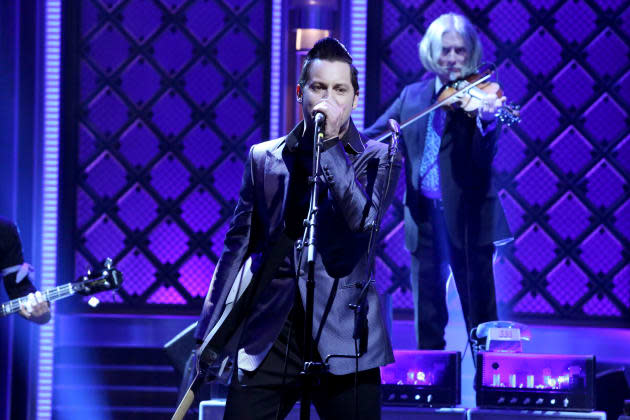
Jack White performs on The Tonight Show in February.
Let's look at Jack White, for example. White is one of the artists that took the stage alongside a dozen or so others a couple weeks ago to declare his part ownership in Tidal. He owns a label, Third Man Records, that published not only his solo work, but also that of his previous acts The Dead Weather and The Raconteurs. Since labels typically handle distribution, which would include any deals with streaming services, White seemingly has the final say as far as his music is concerned and can license it however he wants. In this case, his work is licensed to Columbia Records, a company with a much larger distribution network than his own outfit.
In Rihanna's case, her new album could very well be the first exclusive release for Tidal.
There's a way around a label's control and that's if the artist's contract affords them the rights to the master recordings. Just last month, reports surfaced indicating that when Rihanna's upcoming album releases on Roc Nation (Jay Z's imprint), she'll own the rights to those files. More recently, Jay Z just gained the rights to two more of his albums. What does that mean exactly? Well, typically, when artists hand over those master rights to a label in exchange for shouldering the costs of recording and distribution, they lose the ability to make licensing decisions. But in Rihanna's case, it means her new album could very well be the first exclusive release for Tidal -- one that's sure to be among the most popular albums of the year.
The inconvenience of exclusivity
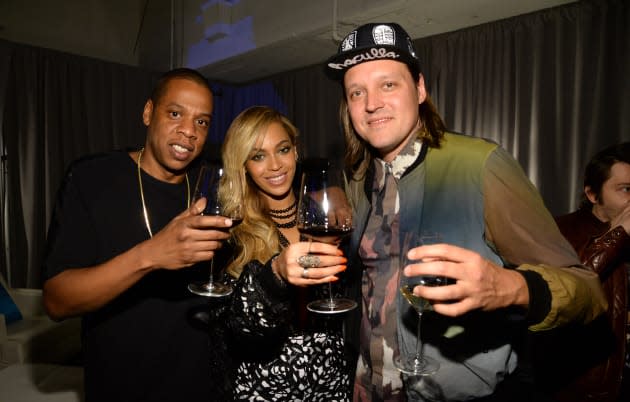
Jay Z, Beyoncé and Arcade Fire's Win Butler at the Tidal relaunch
While financial terms of each artist's involvement in Tidal haven't been disclosed, it's hard to imagine any backer who's financially invested not releasing their next album as an exclusive (timed or otherwise) on the service. We know that Jay Z purchased the service's parent company, Aspiro, for $56 million and he recently told Billboard that each of the artist-owners had an equal stake. Turns out that equal stake is 3 percent each, with the rest of the shares divided up among Carter, investors and record labels. There will be additional shares available for second- and third-tier backers too, but these 16 folks are the key players.
So far, Tidal's advertised exclusive content has been restricted to videos, singles and meet-and-greet contests. But with the possibility of other artists in Tidal's camp retaining control of their master work, we could very well soon see full albums play a key role in the streaming-music wars. And that's bad news for consumers. If you're a fan of Rihanna, but are a faithful Spotify user, well, you could be left in a pinch. The (sorta) good news is most artists don't have that kind of control over their work, which bodes well for rival streaming services.
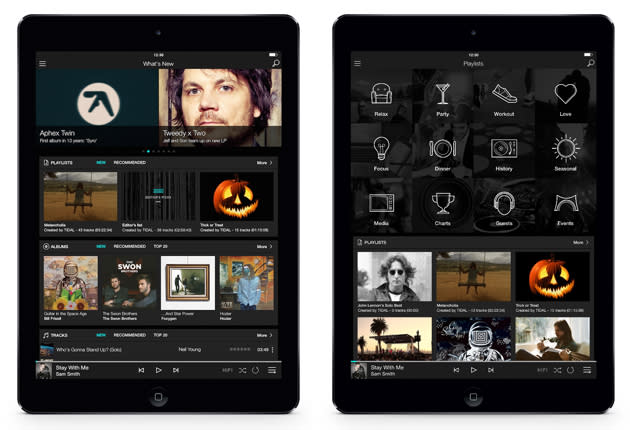
Tidal's iOS app
"If I put a record out, does it make sense to be exclusive on Tidal? Only if they're paying significantly higher rates and they have all of the traffic," says David Bakula, Nielsen's SVP of Analytics.
Reports indicate that Tidal and Aspiro's other music offering, WiMP, had 512,000 subscribers when Jay Z and co. took over operations and merged the two (Tidal so far has not released updated subscriber data). That's significantly less than Spotify's 15 million, even if they are offering better compensation per stream. But does that matter? Most of the money paid out from streaming goes to labels and the folks who handle licensing anyway -- not the artists. It's likely major labels won't want to risk profits in an attempt to lure customers to Tidal under the banner of exclusivity.
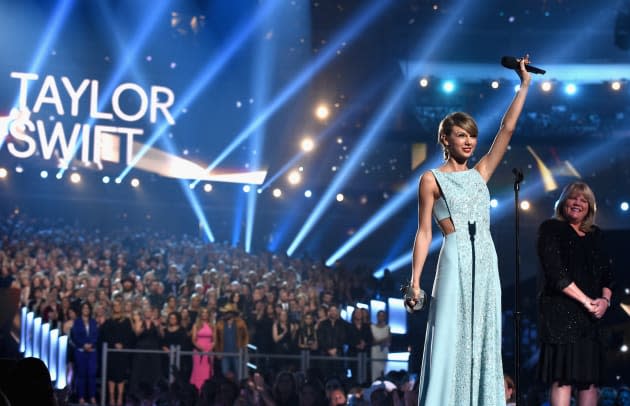
Taylor Swift at the Academy of Country Music Awards
"If a consumer goes to a place and content isn't available, a lot of times they'll just move on," Bakula continues. "As an artist, when you have to reach your fans everywhere that they are, I don't think you can afford to say, 'I'm just going to be here.'" And being everywhere is what turned the likes of Taylor Swift, Radiohead and others into the massive acts they are. "It's different for Taylor Swift, because she has become as big as she is by doing all of those things and being everywhere, building that fan base up," Bakula says. The lesson: People will likely follow Swift to a specific streaming platform, but they probably won't chase after Tame Impala.
People will likely follow Taylor Swift to a specific streaming platform, but they probably won't chase after Tame Impala.
"I think for the most part, the idea of exclusives is not good for fans," Rdio CEO Anthony Bay told Bloomberg last week. "The idea that people will subscribe to multiple music services in order to get just a few songs or a few artists I think is going to slow down the whole category. It's hard enough right now to get people to want to pay and understand the value of $10 a month." Bay believes that if exclusivity deals start to dominate streaming, it'll be easier for folks to go back to buying full digital albums.
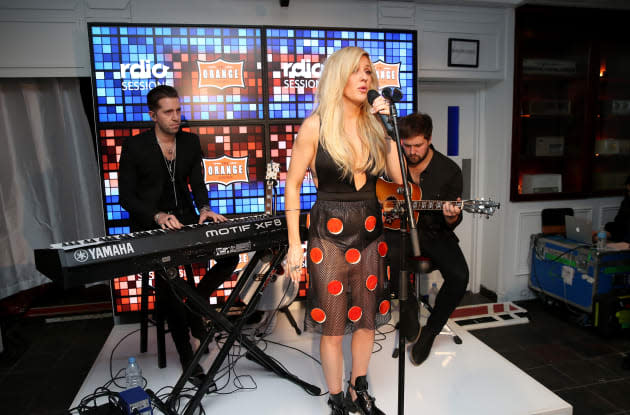
Ellie Goulding performs at the Rdio House in Toronto.
That said, Bay admits no one really knows how the concept of exclusives will play out. It could be a matter of a timed window, with a new release only being available on a particular service for a week, or even a month. Or, and this would be the worst-case scenario, artists would tie all of their digital catalogs to Rdio, Spotify, Beats or Tidal. Today, $10 a month for streaming a library of millions of songs is already a tough sell for some. But if you up that to around $30 or more per month just to have access to the full roster of your favorite musicians across multiple apps, then the streaming-music renaissance grinds to a halt.
The reaction

Apple's Tim Cook and Beats co-founder Jimmy Iovine at a Grammy event
The use of exclusive releases is more a question of "when" than "if" for Apple's upcoming Beats Music/iTunes streaming service. iTunes has done this already (remember the great U2 debacle?), offering an album for purchase on its platform before it's made available on services like Spotify or Rdio. Usually, though, these iTunes exclusives take the form of bonus tracks or videos. But whatever form exclusives take on the company's new subscription service, it's by no means a stretch that Apple will continue to flex its muscle and sign exclusive deals, especially in the wake of Tidal.
Right now it seems possible the streaming-music sandbox mentality could triumph over consumer choice.
According to Billboard, Beats co-founder Jimmy Iovine attempted to lure some of Tidal's backers, before its relaunch, over to the upcoming Beats Music service. What's more, Bloomberg's sources say that Apple is looking to lock down exclusives from artists like Swift and Florence and the Machine, whose How Big, How Blue, How Beautiful could be the big album of the summer.
So where does this leave the streaming companies without Apple's deep pockets or a collection of popular musicians? Rdio's already gone on record to oppose the exclusives strategy and Spotify doesn't have the financial heft to compete. The Swedish company's been clear about its financial model; that it's not making any money and paying out most of its revenue (around 70 percent) to labels and publishers. That leaves only two major streaming music competitors to duke it out: Tidal with a roster of artists who control their own destiny, and Apple with its billion-dollar coffers.
Salute your solution
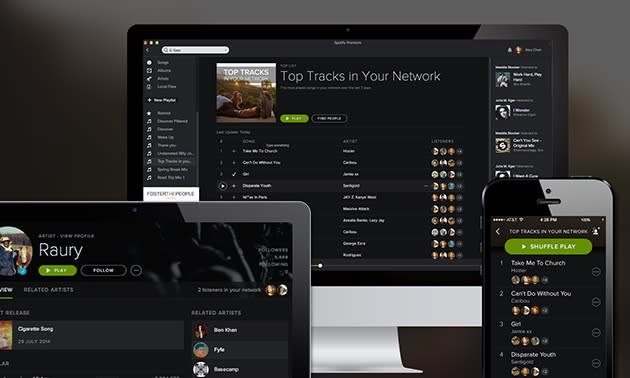
Spotify's suite of apps
For the first time, last year streaming music sales surpassed physical CD sales, with subscriptions earning $1.87 billion, a 29 percent increase from 2013, versus $1.85 billion in CD revenues for all of 2014. Of course, streaming services have not overtaken downloads... yet. That's still a $2.58 billion-per-year business, nabbing 37 percent of the market, but change is coming. With Spotify and Rdio continuing to add loads of new subscribers each quarter, and Apple's expected service debut this summer, however, those numbers will surely continue to close the gap between downloads and services. Spotify, for example, added 2.5 million paying users between November and January, bringing its paid subscribers base to 15 million.
If the crux of the issue is artist compensation -- as it appears to be for Tidal's roster -- then that's something that should be resolved another way. I get that artists sign over their rights in a record deal and, in doing so, miss out on a big cut of streaming royalties until they can renegotiate. But there has to be a solution to the issue that doesn't anger consumers and stymie the streaming revolution.
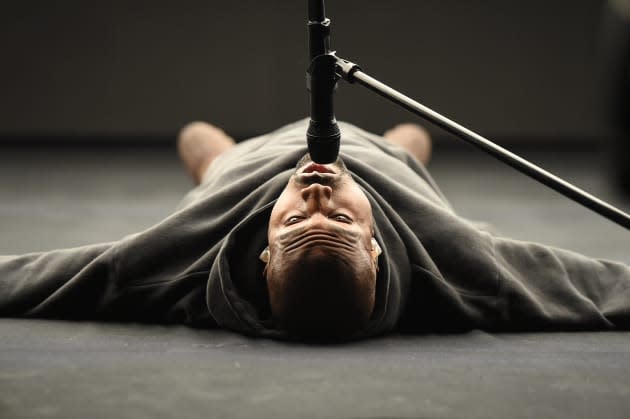
I feel ya, Kanye.
There's no question that people are going to sign up and even switch over to Tidal if it means they're guaranteed Rihanna's album this year, or the next Kanye West release. And that's fine so long as these deals are timed exclusives that don't indefinitely lock out users of rival streaming services. Fair compensation shouldn't be consumers' burden; it's between the artists and the labels that handle licensing deals. Right now, though, it seems possible the streaming-music sandbox mentality could triumph over consumer choice.
[Image credits: Kevin Mazur/Getty Images For Roc Nation (Tidal event); Jamie McCarthy/Getty Images for Roc Nation (Madonna); Douglas Gorenstein/NBC/NBCU Photo Bank via Getty Images (Jack White); Kevin Mazur/Getty Images For Roc Nation (Jay Z, Beyoncé, Win Butler); Kevin Winter/ACM2015/Getty Images for dcp (Taylor Swift); Karl Walter/Getty Images (Ellie Goulding); Michael Kovac/WireImage (Tim Cook and Jimmy Iovine); Theo Wargo/NBC/NBCU Photo Bank via Getty Images (Kanye West)]
